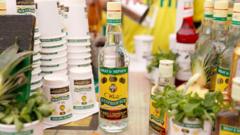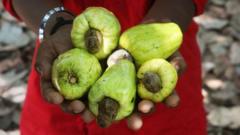A legal conflict in Jamaica centers on the definition of "Jamaican rum," with producers divided over new regulations that prohibit aging rum overseas. This debate raises questions about cultural heritage, economic implications, and the importance of geographical indications for the island's rum industry.
Jamaican Rum Dispute Highlights Cultural Heritage and Geographical Significance

Jamaican Rum Dispute Highlights Cultural Heritage and Geographical Significance
Ongoing legal battles in Jamaica explore the essence of what defines Jamaican rum and its cultural identity, amid concerns over authenticity and international markets.
The roots of rum run deep in Jamaican culture, yet a recent dispute has sparked controversy around what genuinely constitutes “Jamaican rum.” The ongoing legal battle reveals the complexities involving geographical indications (GIs), authenticity, and safeguarding a significant aspect of cultural identity and economic livelihood.
In October 2022, Jamaica's Intellectual Property Office (JIPO) enacted amendments to the geographical indication designation for Jamaican rum, which was originally established in 2016. A key stipulation is that rum must be aged on the island itself, a move pushed by the Spirits Pool Association (SPA) representing six major distilleries, including renowned names like Appleton and Hampden Estate.
The SPA contends that a reinforced GI designation is crucial for Jamaica’s rum to receive appropriate recognition in critical export markets like the EU and U.S., ultimately defending it against competition while emphasizing its premium quality tied to a specific location. However, National Rums of Jamaica (NRJ)—which controls Long Pond and a significant part of Clarendon—argues that this amendment threatens its business model that relies on exporting rum in bulk for aging abroad. This company, now linked to the French spirits firm Maison Ferrand, maintains that imported and aged rum can also be considered Jamaican.
Christopher Gentles, General Manager of SPA, underscores that proper aging in Jamaica is non-negotiable for defining authenticity. He expresses confusion towards NRJ’s objections, arguing the economic disadvantage that aging rum overseas can bring, including loss of value-added processes and tourism opportunities for Jamaica.
The discourse sheds light on the broader implications of geographical indications, which can significantly elevate prices and safeguard products from generic replication, as outlined by Dev Gangjee, an intellectual property law professor. Well-known examples such as Scotch whisky and champagne showcase how GIs can foster regional identity and tourism.
Meanwhile, the debate isn’t limited to Jamaica. Barbados finds itself in a similar predicament, struggling to establish its own GI due to objections related to aging practices, causing frustration among local producers.
As Jamaica's rum industry anticipates the outcome of the current proceedings at JIPO, the SPA is hopeful for a resolution that embodies both cultural integrity and economic viability. Local sentiments echo through publications like The Gleaner, which advocate for protecting the heritage and distinctive character entailed in the brand of Jamaican rum.
Through this unfolding story, the resilience of Jamaica’s spirits industry and its dedication to authenticity is spotlighted, reflecting a desire not just for economic benefit, but for pride steeped in history and cultural prominence.





















